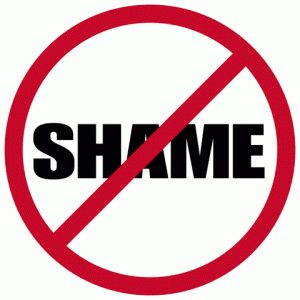 Let us not look back in anger, nor forward in fear, but around in awareness. -James Thurber
Let us not look back in anger, nor forward in fear, but around in awareness. -James Thurber
Man can alter his life by altering his thinking. – William James
Summary of Shame Part I:
In the previous article about shame, I presented the definition of shame, and how it often arises in conjunction with other emotions such as fear or anger. I also described the difference between shame and guilt: shame being the feeling and belief that something is wrong with you, while guilt is the feeling of remorse that arises when you regret a behavior. Shame is about personhood, guilt is about behavior. If you have not read Part I, and would like to, please visit my articles page at: www.cultivateconfidence.com.
Shame and the Low Self-Esteem Connection:
Low self-esteem is the belief that you are not worthy of living the life you wish to live. When you don’t feel good about who you are, life seems meaningless because you are not pursuing your dreams, aspirations, and passions. Shame and low self-esteem feed each other in a vicious loop.
So how to get out of the shame/low self-esteem loop?
Cultivating the skill of self-awareness is the first step to stopping the cycle of shame and low-self esteem. Self-awareness means that you are able to take a step back and observe yourself, with a non-judgmental attitude. Like honing any skill, this takes practice. When you first become aware that you are feeling shame, observe the following things:
- What external circumstances are present when shame arises?
- What are the shameful thoughts that accompany the circumstances?
- Are there other feelings that arise in conjunction with the feeling of shame? (anger, fear, joy, etc…)
- How does your body experience shame? (Muscle tension, difficulty breathing, etc…)
It may be helpful to keep an observation log. You are in a sense, collecting data. You can set up 4 columns in a journal that might look like this:
Circumstances Thoughts Other emotions Body Sensations
Boss criticized my work I never get it right, I am so stupid anger, fear difficulty breathing, tightness in chest, anxiety in arms and legs
Once you are aware of what external circumstances trigger shame in you, then you can begin to work with your experience in a different way.
Recognizing Patterns:
This log will help you recognize your patterns and sensitivities, and will point the way to change. For example, if you notice that criticism is often what triggers shame, you can begin to relate to yourself in a different way when you are feeling criticized. Instead of being swept away by your negative thoughts about who you are, you can take a step back, and try and look at the situation through a more objective lens. (Do you even care about this person’s opinion?) You can also offer yourself something very important – compassion.
Offering Yourself Compassion:
You can observe and choose your thoughts. When you notice you are having a negative, shameful thought about yourself, try a different thought. For example:
- “I don’t have to be so hard on myself.”
- “I am sensitive to criticism.”
- “This person’s opinion really isn’t the determiner of my self-worth.”
Coming Back to the Present:
Then try breathing, and relaxing. Bring your awareness back to the present moment. What is happening in the environment? What do you hear, see, smell, taste, and touch? Bring your attention to something other than your thinking mind.
Consider an Appropriate Action:
There may be something you wish to do after noticing what triggers shame inside you. To continue with the example of criticism, you may want to talk to your boss and let him or her know how you best receive feedback. Or, if it is a family member, you may want to make a request or set a boundary such as, “Mom, I would like to request that you keep your opinions about my parenting to yourself. From now on, when I am feeling criticized, I am going to excuse myself from the conversation so I can have some time to myself.”
What if this doesn’t work?
Just like trying any new skill, relating to shame in a different way will take practice. Don’t give up after the first time you’ve tried it. Also, a reminder that you will have to be present with feelings, thoughts, and actions that are outside of your comfort zone at first.
What if I did really screw up?
We all make mistakes. If you did something you feel bad about, see if you can focus on how to make amends for your behavior, such as an apology, rather than beating yourself up. Ask yourself the question: Is berating myself for what I did going to help change the situation?
Our errors are surely not such awfully solemn things. In a world where we are so certain to incur them in spite of all our caution, a certain lightness of heart seems healthier than this excessive nervousness on their behalf. – William James

